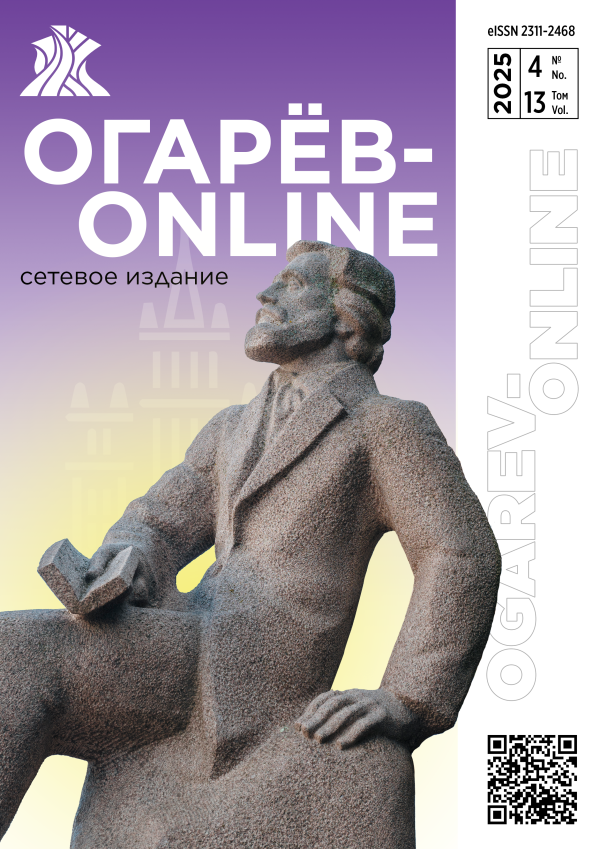Vol 11, No 9 (2023)
- Year: 2023
- Published: 20.09.2023
- Articles: 10
- URL: https://ogarev-online.ru/2311-2468/issue/view/17197
Full Issue
Structural-semantic and stylistic analysis of borrowings in modern newspaper texts
Abstract
The article considers the use of borrowed vocabulary in modern media texts on the example of the Culture newspaper. The reasons for the penetration of borrowed words into the Russian media are revealed, the classification of borrowings by thematic groups is given. Based on the results of the study, it was found that Anglo-Americanisms are the most frequent borrowings in modern Russian media.
 2-9
2-9


Active processes in the sphere of abbreviation in the modern Russian language
Abstract
The article is devoted to the issues of abbreviation development as a way of word formation and the use of abbreviations in different time periods. The relevance of abbreviations in the texts of the modern newspaper "Avangard" is studied. The newspaper is considered an authoritative source that reflects the social life of a Russian region today.
 10-16
10-16


Semantic classification of phraseological units with adjective component in Russian dialects of Mordovia
Abstract
The article presents the semantic classification of phraseological units with adjective components in the Russian dialects of Mordovia. The authors define their types by the degree of semantic inseparability. The specifics of the dialect phraseological units in comparison with the literary Russian language is revealed.
 17-23
17-23


Phraseological units with the meaning of speed of action in the modern Russian language
Abstract
The article analyzes the phraseological units that express the meaning of the speed of action in the modern Russian language. The author reveals the features of their semantics and structure, determines their composition and linguacultural features. Phraseological units that serve to convey the course of action in time are on the periphery of the functional-semantic field of aspectuality.
 24-30
24-30


Lexico-stylistic features of Russian media texts
Abstract
The article studies the lexico-stylistic features of regional Russian media texts using the example of the electronic newspaper "Stoliсa S". The role of phraseological units, colloquial and bookish words, particular tropes in the organization of texts of different thematic scope is shown.
 31-38
31-38


The World of the East in the Poetry of V. Bryusov
Abstract
The article addresses the issue of Bryusov's appeal to the topic of the East in his poetry. Analyzing three volumes of verses in the collected works, the authors come to the conclusion about two approaches of the poet to the image of the world of the East: as an important component of the part of world culture, the development of which should be engaged in the poet-symbolist, and as a space for experiment in the field of form, primarily verse.
 39-46
39-46


"Does your mom need a son-in-law?": pick-up lines and sayings as part of youth humorous folklore
Abstract
The article deals with Russian pick-up lines and sayings as a type of youth humorous folklore. The genre nature of the sayings is described; their structural types, semantic content, functions are revealed. The evolution of the paroemia genre in the conditions of modern society is traced.
 47-55
47-55


Pushkin's poetic novel in parodies and rehashes of the beginning of the XXI century
Abstract
The article deals with the development of the first Russian realistic novel in verse "Eugene Onegin" by A. S. Pushkin in the poetry of the beginning of the XXI century. An analysis of the works of V. Dagestansky and E. Abramov allows us to conclude that the authors use parodies and rehashes to interpret the original text. In such texts, the authors describe modern reality with its iconic signs, initiate a dialogue with the classic author, and show the ability to stylize their own texts.
 56-61
56-61


History through the eyes of a child in the prose of M. A. Sholokhov: a case study of the story «Nakhalenok»
Abstract
The article is devoted to understanding the principles of literary presentation of historical events and persons through the eyes of a child in the prose of M. A. Sholokhov. The author analyzes the story «Nakhalenok» which includes the mythologized image of Lenin created by the imagination of the boy Mishka. Mythologization is understood as a literary technique of creating an image aimed at democratizing the perception of a historical person.
 62-66
62-66


The Concept of "God" In F. M. Dostoevsky's novel "The Brothers Karamazov"
Abstract
Comprehension of the concept of "God" through the prism of the novel by F. M. Dostoevsky contributes to the disclosure of the inner world of the author and the characters, shows the correlation of ideas about the ideal and reality, allows us to comprehend eternal questions reflecting the connection of language and thinking. Starting from the lexical meaning of the word "God", the authors come to a logical analysis of the concept of "God".
 67-73
67-73

















